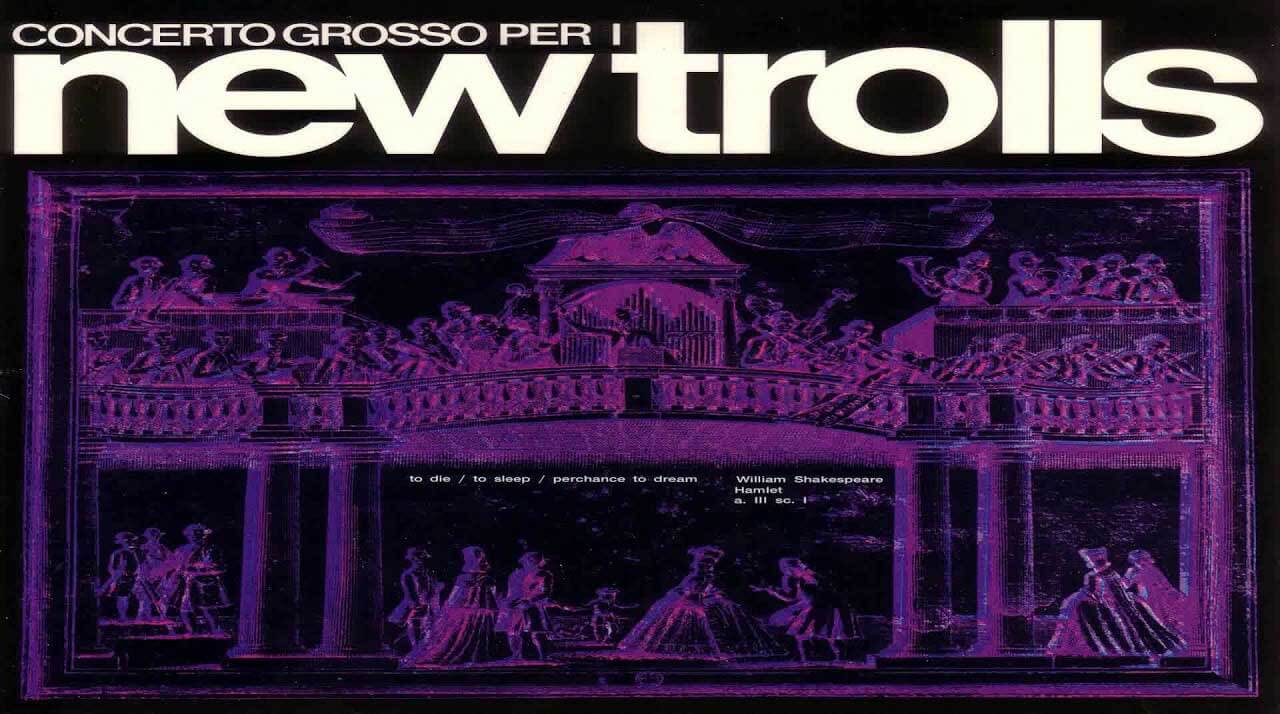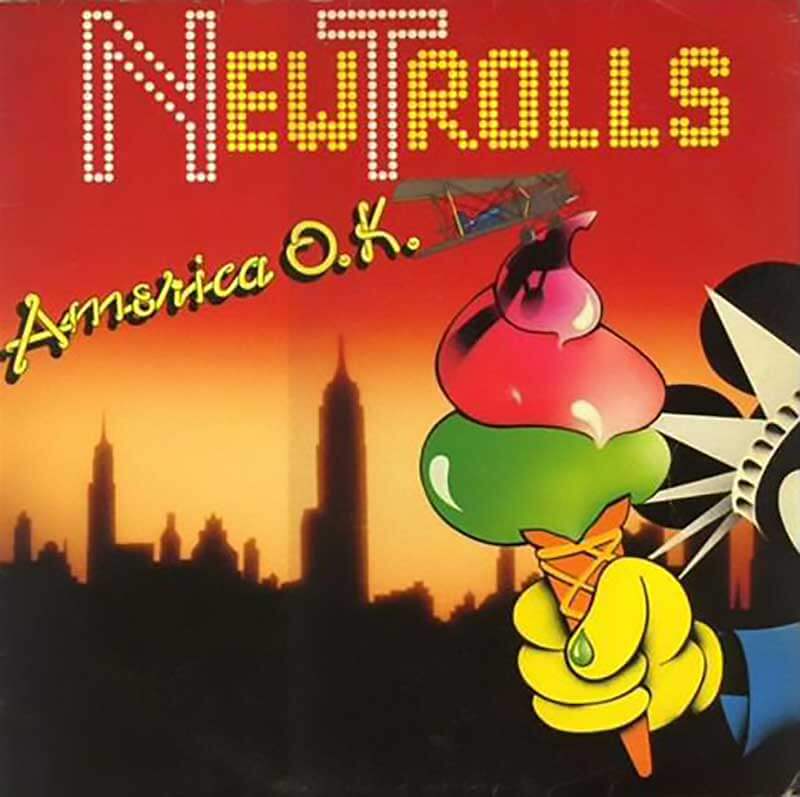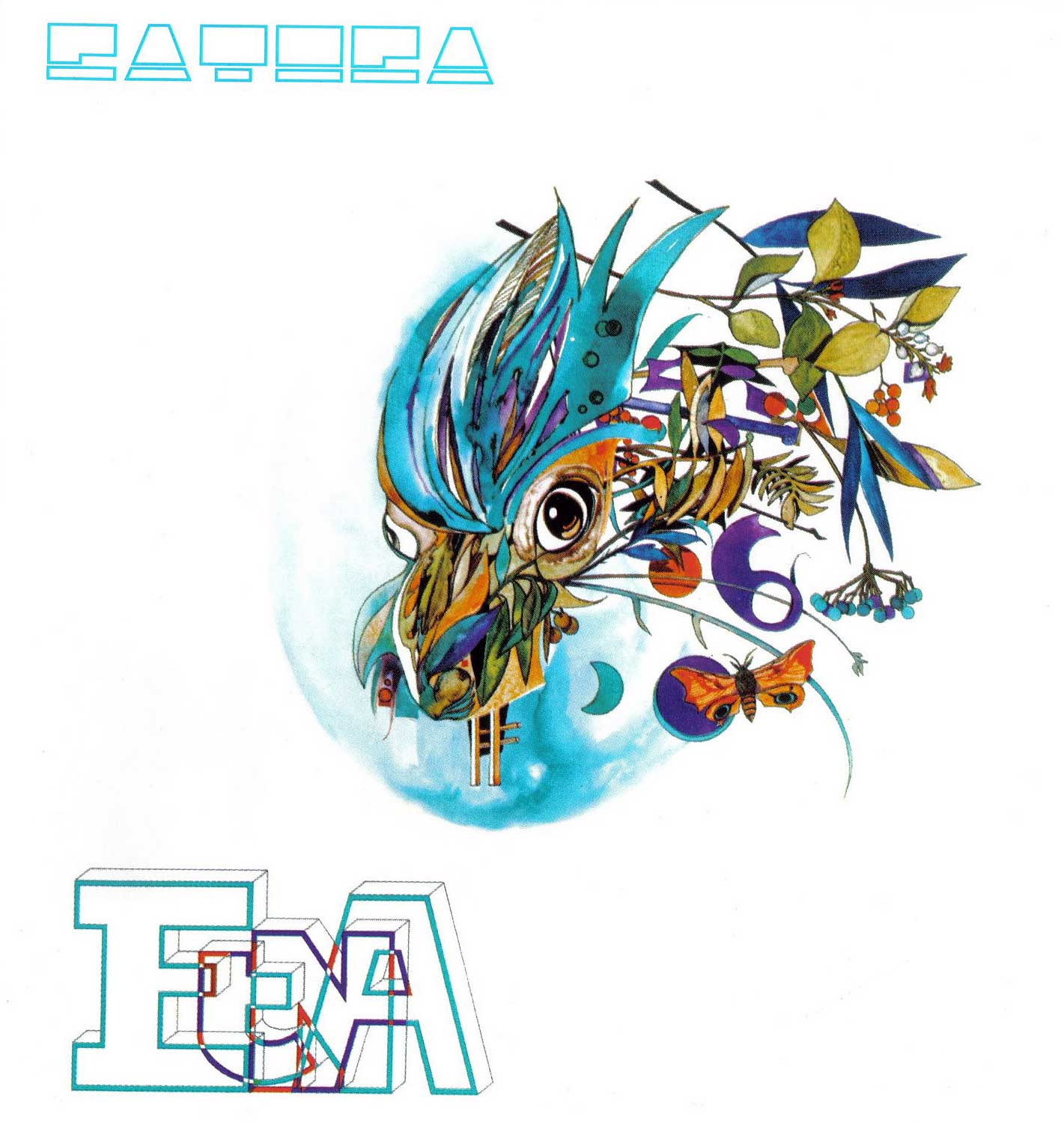”To be clear, the New Trolls were , and remain, one of the ten most talented groups musically, technically and artistically. However, the Italians are well known for their ridiculous capacity of snubbing their co-patriots in favour of dubious foreign offerings.
Daniele Pieraccini - Lorenzo
Dealing with the glory of the past is not always a pleasant task and when it regards Italy there is often more pain than joy because when we talk about masterpieces we understand that for various reasons (almost always mere grabbing by political scoundrels and ruthless speculations) have never been recreated.
We often find we can rediscover excellence that leaves a sense of wonderous stupor, deep affection and dispiriting sadness all together.
This is the case of “FS” by New Trolls, an album that is so great that in any other country but Italy it would be considered a national treasure, be glorified by honest criticism and buried in Golden Records.
It would surely still be heard on the radio today at least as often as the same old Pink Floyd.
A track like “Il Treno” with its magnificent composition, inventive imagination, technical expertise and evocative sincerity has no parallels in modern music.
And this is not the first time this can be found in the New Trolls’ music. They can really be considered to be an exception in the 1980’s.
To be clear, the New Trolls were , and remain, one of the world’s most talented groups musically, technically and artistically.
De Scalzi and Di Palo, in addition to being great singers with uncommon vocal talents who made the choral and solo parts of the group an unmistakable trademark, were and are superfine composers and multi-instrumentalists (as it is well known Melody Maker was so impressed by Nico that they included him in the list of the 10 best European guitarists of the 70s, when he was still very young).
However, the Italians are well known for their ridiculous capacity of snubbing their co-patriots in favour of dubious foreign offerings.
Xenophilia is a mental affliction that has too long afflicted the population which has taught almost every art form to the rest of the world. (Take ice cream for just a basic example).
It’s no accident that these pioneers of progressive Italian rock came from Genoa.
Apart from the well-known cultural movement the “scuola Genovese” which forged incredible talent, the Ligurian capital was notable for L’Alcione, a historical theatre and cinema dating back to 1948.
It was originally named “Colosseo” and closed at the end of the century having been reduced to showing x-rated films to survive.
In the 60s’ and 70s’ L’Alcione became a hub of theatre, the avantgarde and, most of all, progressive rock. Amongst others Van Der Graaf Generator, Genesis, Gentle Giant and Peter Hammill played there.
In 1973 “Tempi Dispari” was recorded by NT Atomic System, a side project of the original band, following disagreements between members. (Take note of the excellent “Ibis” by Nico di Palo.)
Two years earlier the band had embraced prog by recording “Concerto Grosso per I New Trolls”, a milestone on the rock scene, which was truly unique and the likes of which had never been heard in Italy. This was followed in 1976 by the less successful “Concerto Grosso No 2”, which is certainly worth revisiting.
Beginning with psychedelic beat, De Scalzi and co also experimented credibly with hard rock. (Check out the stoner “C’è troppa Guerra” from 1973 which was really ahead of its time). The group moved through several genres and eventually stuck with pop rock, continuously maintaining a high level.
It is also worth mentioning their maniacal dedication to finding the “right” sound for each genre, especially concerning guitars.
After various albums, hit singles and working with other artists, The New Trolls made it to 1980 having lost Giorgio Usai (keyboards) and Giorgio D’Adamo (bass) along the way.
With this line-up ,consisting of Vittorio De Scalzi (vocals and keyboards), Nico di Palo (guitar, bass and vocals), Gianni Belleno (drums and vocals) and Ricky Belloni, they hit the “Double” recording studios of Idea di Milano, with the technician Andrè Harwwd and the producer Gianfranco Lombardi, to get the 80s’ started in their own way.
The result was “FS” a concept album based around a train journey and the passengers encountered on the way. A concept record (an idea held dear by progressive musicians) which offered an extraordinary amalgamation of sounds and genres including rock, pop, classical, reggae and new rock/wave.
The New Trolls maintained their distinctive progressive style despite working in the pop genre, producing incredibly virtuoso instrumentals and polyphonic vocals that have few rivals internationally.
New Trolls – FS
The album begins with Nico di Palo’s guitar which, using an echo, effectively recreates a train whistle and wheels: “Il Treno (Tigre-E66-1979)” a musically rousing image of poetic realism with pauses for effect and guitars explosions, is narrated by the great voice of De Scalzi.
When playing live, the group performed even greater versions of this song and it is a real shame that there are no existing remastered live recordings that do justice to their performance.
“Il Treno” is a far-reaching track, a strong introduction to the concept, a poetic ode to travel transmitting a sense of both detachment and adventure.
The track introduces the various characters we meet during the journey.
The next track “La signora senza anelli” is sung in unison and introduces a rock riff which has traces of the past and anticipates “Money for Nothing” by Dire Straits.
Belloni plays the solo while Di Palo backs him up with his great poppy bass, which not only provided the rhythm but lightens the sad story of a lady who was once wealthy but has been reduced to poverty to support her son’s frivolous ways and his departure for “L’America”.
She has sold her last ring in order to be able to afford to take the uncertain journey to see her son again.
In the lyrics there are references to drugs and towards the end it is therefore understood that the lady’s son may even have died of it and the woman’s journey may therefore be aimed at recovering his remains.
The internalized war of “L’uomo in blu” confirms the guitar’s central role on this album.
The instrumental arrangements perfectly accompany the dramatic story of a man torn apart by internal and external conflict.
A super condensed book of rock, a great intimate song about war.
The connection between musical phrases, descending arpeggios, sharp licks and screaming, but profound, solos, all backed up De Scalzi’s synthetic strings emphasize the interior drama of this man who is narrated by Di Palo’s voice.
This track is a fine work based around the 6 strings of Belloni’s Yahama SG and Di Palo’s Yahama SX.
Guitars are once again the main feature in “Stelle nelle tue mani”, a seemingly more upbeat number, arpeggios and vocals by Di Palo plus the New Trolls fantastic choral harmonization while Belloni scores highly with his saturated guitar solos and quick harmonic phrasing.
The hands in the title belong to a beautiful girl who “collects” lovers, clothes and lies with pure nonchalance while her life and her youth speed away.
Obviously, her thoughts pursue her but the temptation to drown her sorrows, and the uncertainty of the future, in nights of madness win over and she continues to escape from herself and find new beds, and new clothes and hide behind her dark glasses until the lies, beauty and lovers (the “stars” of the title) are just a distant memory and reality is all that remains.
“Gilda 1929” is a 4-part harmonic choral acapella piece giving voice to the nostalgia of Liberty and the lost age, using a classical-baroque structure. Nico and Ricky Belloni sing metaphysical lyrics that reflect on the meaning of life and how it is necessary to take the motion of creativity risks because remaining static is a denial of existence.
(“Se la tua immortalità
È stare fermo qua
Ferro non lo sai
Che è meglio fondersi nel fuoco
Che non partire mai”)
(“If your immortality
It’s just standing still
Iron don’t you know
It’s better to melt in fire
Than never leave”)
In this part they get the chance to reflect on the Chemical Wedding and the desire to achieve this conjunction as the apex of a life of inner growth.
The evocative atmosphere of the piece ends with nuances of Bach. This time it is De Scalzi’s melancholic and vibrant synthetic violins that are supported by the duo’s harmonic guitars and carry the listener towards the wharf where the protagonist will set off on his journey once again.
The sound of railroad tracks leads to a fine guitar arpeggio which anticipates the Italian style of the 80’s. “Quella luna dolce” is a tender and intimate ballad with a great fretless bass played by Di Palo.
De Scalzi sings with infinite sweetness while the famous voices of the New Trolls harmonize on the chorus and Belloni takes care of the bridge.
The piece reflects on the journey from child to man and the moon is the mother (or maybe grandmother) who accompanies the first steps, passing through adolescence into maturity, at which point the moon itself becomes the closest companion and will hopefully accompany you for the rest of your life.
Once again metaphysical themes and reflections on existence are transmitted through the metaphor of the train journey.
The closing verses are beautifully played in their simplicity:
(“Quella luna dolce coi suoi occhi stanchi
Mi vedeva già grande
Gliel’avevan detto i suoi capelli bianchi
Che finiva così”).
(“That sweet moon with her tired eyes
She saw me already grown up
Her white hair told her
it would end like this”).
“Il serpente” is a catchy, intelligent reggae track. The Caribbean genre was also popular with other Italian artists at the time, for example Berté and Fossati.
The protagonist of the song is not afraid to look people in the eye, despite being disillusioned and conscious of taking risks, especially when it comes to love.
He feels the relationship with his partner fading due to apathy and searches for contact with her to try to prevent them breaking up.
The metaphysical metaphor is lighter this time, at least musically.
This track, which was chosen to launch the album, makes much use of the Vocoder and harmony vocals.
Once again it is De Scalzi’s voice, this time filtered through the Vocoder, which kicks off “La mia canzone”, a classical nuanced song in the disco-music style which was popular at the time. This is a well-performed sweet love song dedicated to music and the tender fragility of human and artistic inspiration.
The lyrics have reminders of Lucio Battitisti’s wonderful and sad “Io vorrei…..non vorrei…ma se vuoi” and underline how the love of music can be as beautiful and sorrowful as the love for a woman.
The journey ends at the station with “Strano Vagabondo”, sung in falsetto by Belleno and backed up by De Scalzi’s bass vocals with beautiful vocal harmonization provided by the whole band.
The protagonist visualizes the light-headed dreamy side of himself, like a vagabond who lives life with adventurous light-heartedness, a characteristic which he feels the need for and which makes him imagine a trip around the world with the friend he always wished he’d had.
FS is an anthem to freedom from a group who was always been sincere, original and concrete in transmitting his message to its audience.
Of course, the New Trolls have adapted to the times, have achieved great sales successes, collected participations at the Sanremo Festival but maybe because they were more interested in reacting to their audience while being averse to political machinations, they failed to get the recognition awarded to other bands.
Each piece of FS condenses and presents numerous quotations from the history of popular or cultured music in a coherent and harmonious way. Nowadays, this thematic work appears to be a kind of witness statement, a recording of the end of an era.
FS represents the last cry of hope, of art, of music. Of humanity.
Life ended in 1980 but none of us realized it
It is not by chance that “America ok” was the New Trolls’ follow-up album.
The desperately ironic title represents the artistic end of The New Trolls.
It is difficult to believe this is the work of the same 4 musicians who gave life to FS. The instruments are purely electronic and the mood is nihilistic, as if the end of the world is being observed with a drink in hand, as though nothing is happening.
It’s a sneaky, but direct attack – if you have the courage to see it – on the xenophilia which became increasingly more obvious with the baby boomer generation, a real viral disease that is bringing about the downfall of the whole Italian musical scene in favour of the, often awful, horrors which come from over the ocean, or over the channel (or from beyond the grave?)
“America Ok” ends with a clamorous rip-off of “Open Arms” by Journey, a sort of direct provocation to America, the nation which commands and devours everything without recognizing the merit to true inspirators.
Instrumental and vocal skills remain intact and there are valuable tracks but the fact is that “America Ok” is so conceptually far from FS that it is difficult to believe that only 2 years separate them. Musically and lyrically they seem to come from two different worlds.
The darkest aspect can be found in the lyrics where we can find phrases such as “On this bitter beach I have become a thing”, “My generation has turned off” and “There is no more time”.
Now that we’ve reached the end of the pro-American line, without the possibility of escaping from the total ruin caused by the great deception, we understand that life really finished in 1980 but none of us realized it.


















